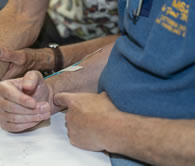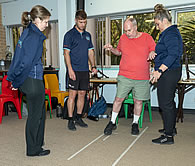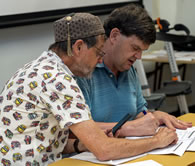The Coaching Workshop
Evidence-based coaching skills for rehabilitation professionals

What is the difference between an instruction and a cue?
How beneficial is it to provide demonstration before practice?

What is the difference between internal and external focus instructions?
What type of feedback is beneficial for learning?

How much feedback is beneficial for learning?
What can therapists do to motivate people to do more practice?
Overview
This workshop focuses on developing coaching skills for use in rehabilitation settings with patients/clients. Being able to teach effectively is an essential skill for professionals working in rehabilitation and other areas of health. This workshop will enable professionals to reflect on and improve their coaching skills and practise strategies to optimise rehabilitation outcomes.
Skills that may be used as examples include standing up, walking, reaching, manipulating objects such as cutlery, writing, eating, getting out of bed and dressing. Videotaped examples will be used for analysis. Content can be applied to other skills that health professionals may need to teach (eg skills taught in acute medical/surgical wards, home and residential settings). Content will be applicable to health professionals who teach students, novice practitioners, family members and attendant carers.
During the workshop, research will be presented and practical examples of strategies to optimise a learner’s attention using demonstration, effective instruction and cues including goal-oriented instructions, different types and timing of feedback, how to motivate learners with cognitive impairments and/or who dislike practice/exercise, and the role of measurement.
Learning Objectives
By the end of the workshop, learners will be able to:
Discriminate
between instructions, cues, goals and feedback
Use
goal-oriented instructions to encourage and motivate learners
Provide
critical and timely verbal feedback
Motivate
people who have difficulty concentrating or dislike exercise
Adapt
the environment and coaching strategies to enable high repetitions
Provide and receive
peer review about coaching skills
Reflect on and improve
their individual coaching skills
Presenters
Workshop Timetables
Full day
| Time | Subject |
|---|---|
| 8.30 | Overview of the day/lecture notes; |
| 8.45 | Lecture 1 – Coaching basics: Stages of motor learning, using demonstration, verbal instructions and cues |
| 10.15 | Practical: Teach a motor skill, watch videotape, small groups |
| 10.45 | Break |
| 11.00 | Practical: Analyse videotaped UL training session, Annie and Hong |
| 11.30 | Lecture 2 & Practical – Giving feedback: Types, internal/external focus, timing and quantity of feedback, concurrent v delayed/terminal feedback, knowledge of performance (KP) and results (KR) |
| 12.45 | Lunch |
| 13.30 | Practical: Teach a motor skill 2 |
| 13.50 | Lecture 3 – Coaching and practice variables: Strategies to make learning easier for people with cognitive impairments including environmental changes to reduce instructions/talking |
| 14.50 | Break |
| 15.00 | Lecture 4 – Motivating learners: What motivates learners, experiences of learners; internal/external motivation; self-efficacy; mastery; self-management, role of measurement and charting progress and rewards |
| 15.50 | Practical: Analyse videotaped balance training session – Karl & Cathie |
| 16.15 | Q&A time and ‘where to from here’? Review of skills learned, need for further peer review, personal goals |
| 16.30 | Evaluation and finish |
Online – two meetings
| Workshop 1 (3.5-4 hours) |
|---|
| Overview of the session/lecture notes |
| Lecture 1 – Coaching basics: Stages of motor learning, using demonstration, verbal instructions and cues |
| Break |
| Practical: Teach a motor skill, watch videotape, small groups |
| Practical: Analyse videotaped UL training session, Annie and Hong |
| Lecture 2 & Practical – Giving feedback: Types, internal/external focus, timing and quantity of feedback, concurrent v delayed/terminal feedback, knowledge of performance (KP) and results (KR) |
| Q&A – Homework – Evaluation – Finish |
| Workshop 2 (3.5-4 hours) |
|---|
| Review homework |
| Lecture 3 – Coaching and practise variables: Strategies to make learning easier for people with cognitive impairments including environmental changes to reduce instructions/talking |
| Practical: Teach a motor skill 2 |
| Break |
| Lecture 4 – Motivating Learners: What motivates learners, experiences of learners; internal/external motivation; self-efficacy; mastery; self-management, role of measurement and charting progress and rewards. Practical: Analyse videos – balance training session (Karl & Cathie) |
| Q&A time and ‘where to from here’? Review of skills learned, need for further peer review, personal goals |
| Evaluation and finish |




